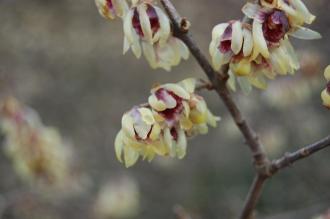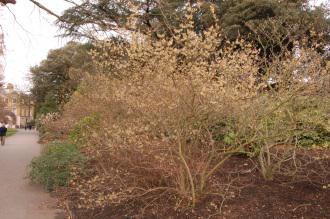
Chimonanthus praecox 'Grandiflorus' flower (21/01/2012, Kew, London)
Position: Full sun to light shade
Flowering period: Winter
Soil: Moist, well drained
Eventual Height: 4m
Eventual Spread: 4m
Hardiness: 6a – 9b
Family: Calycanthaceae
Chimonanthus praecox ‘Grandiflorus’ is a deciduous and bushy medium sized shrub. Its dark green leaves are shiny, lanceolate in appearance and up to 15cm in length. The pendant hermaphrodite flowers of the plant are small, fragrant, waxy and yellow with a maroon center. The branches of the plant are arching in form. The fruit of the plant is a brown, elliptic capsule and up to 4cm in length.
Chimonanthus praecox ‘Grandiflorus’is commonly known as Large Flowered Wintersweet and is slightly less scented than the species. The species Chimonanthus praecox is native to China where it is found at altitudes of 500-1,100m. It was introduced into European gardens from Japan and was noted in England in 1766.

Chimonanthus praecox 'Grandiflorus' (21/01/2012, Kew, London)
The etymological root of the binomial name Chimonanthus is derived from the Greek xeimwn ‘winter’ and anqos ‘flower’. Praecox is derived from the latin term ‘prae’ before and coxi ‘ripening; i.e. early ripening.
The landscape architect may find Chimonanthus praecox ‘Grandiflorus’ useful as a low maintenance, winter flowering, scented shrub.
Ecologically, C. praecox ‘Grandiflorus’ is pollinated by beetles.
The Royal Horticultural Society has given C. praecox ‘Grandiflorus’ their prestigious Award of Garden Merit in 1993.
C. praecox ‘Grandiflorus’ prefers moist, fertile, well-drained soils. It tolerates most pH of soil. It will tolerate alkali soils. It will not tolerate winter water logging.
C. praecox ‘Grandiflorus’ requires little maintenance.

